Daily Vocabulary Words: List of Daily Used Words in Leading International Newspapers
Hi there. Welcome to this special section @ Wordpandit.
Our endeavour here is very simple: to highlight important daily vocabulary words, which you would come across in leading newspapers in the country. We have included the following newspapers in our selection:
• The New York Times
• The Washington Post
• Scientific American
• BBC
• The Guardian
• Psychology Today
• Wall Street Journal
• The Economist
We are putting in extensive work for developing your vocabulary. All you have got to do is be regular with this section and check out this post on a daily basis. This is your repository of words that are commonly used and essentially, we are posting a list of daily used words. Hence, this has significant practical application as it teaches you words that are used commonly in leading publications mentioned above.
Visit the website daily to learn words from leading international newspapers.
WORD-1: Primrose
CONTEXT: To a significant group of Conservative MPs and activists, however, it is a primrose path that beckons irresistibly.
SOURCE: Guardian
EXPLANATORY PARAGRAPH: Imagine a beautiful flower with soft petals and a lovely fragrance. That’s called a primrose. It’s a pretty flower that grows in gardens.
MEANING: A type of flower with soft petals and a lovely fragrance (noun).
PRONUNCIATION: PRIM-rohz
SYNONYMS: None provided
USAGE EXAMPLE:
1. The garden was filled with primroses of different colors.
2. She picked a bouquet of primroses for her mother.
3. The primrose blooms in early spring.
4. They planted primroses along the garden path.
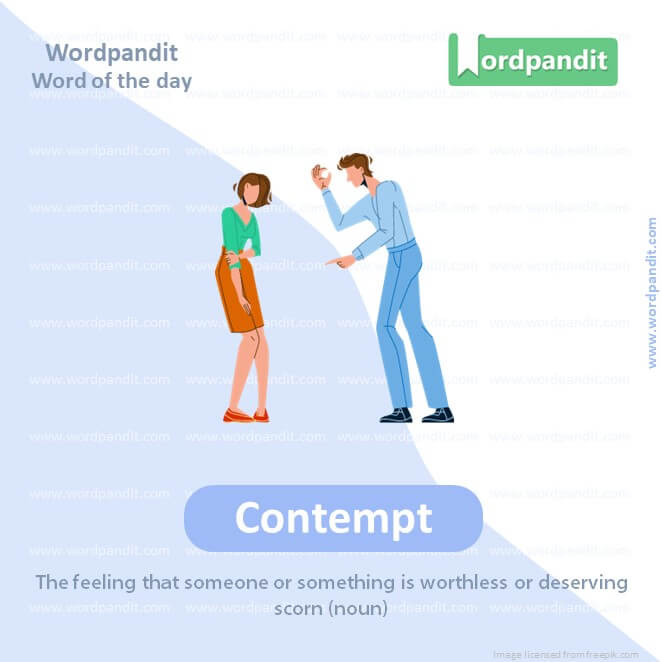
WORD-2: Contempt
CONTEXT: They treat his failure to dent Labour’s poll lead with contempt.
SOURCE: Guardian
EXPLANATORY PARAGRAPH: When someone feels very strongly that they dislike something or someone, that’s called contempt. It’s like when you really don’t like broccoli and make a face when you see it.
MEANING: The feeling that someone or something is worthless or deserving scorn (noun).
PRONUNCIATION: kuhn-TEMPT
SYNONYMS: disdain, scorn, disgust, aversion, hatred
USAGE EXAMPLE:
1. He looked at her with contempt after the argument.
2. The contempt in her voice was evident.
3. They held each other in contempt for years.
4. His actions showed his contempt for the rules.
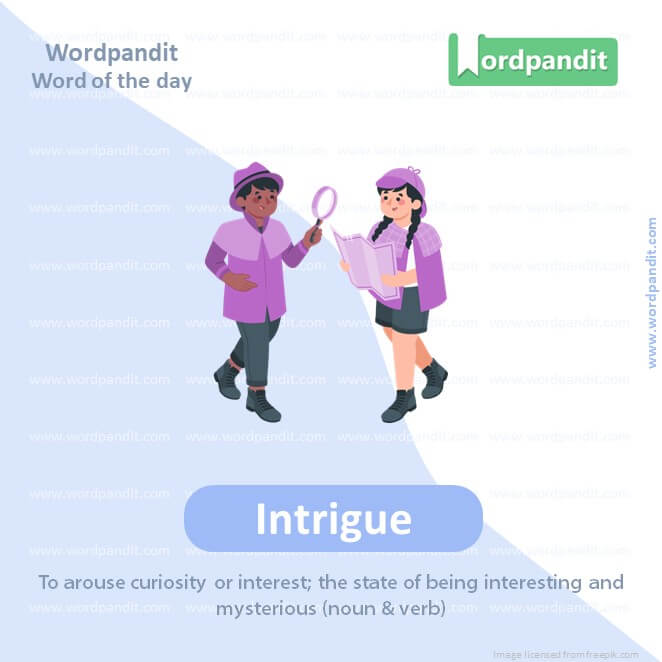
WORD-3: Intrigue
CONTEXT: Boris Johnson and Nigel Farage, though not MPs, will be drawn into the intrigue. Even Dominic Cummings is taking fresh interest.
SOURCE: Guardian
EXPLANATORY PARAGRAPH: When something is very interesting and makes you curious, it’s called intrigue. It’s like a mystery that makes you want to know more.
MEANING: To arouse curiosity or interest; the state of being interesting and
mysterious (noun & verb).
PRONUNCIATION: in-TREEG
SYNONYMS: fascination, curiosity, interest, mystery, allure
USAGE EXAMPLE:
1. The book was filled with intrigue and suspense.
2. Her story was full of intrigue and twists.
3. The mystery surrounding the old house created intrigue among the neighbors.
4. The intrigue of the painting drew many visitors to the museum.
WORD-4: Blundering
CONTEXT: The current, blundering Conservative party nor the super-successful ideological one about which the rebels fantasise is a viable and stable centre-right party of government.
SOURCE: Guardian
EXPLANATORY PARAGRAPH: When someone makes a big mistake because they didn’t pay attention or think carefully, it’s called blundering. It’s like when you trip over something because you weren’t looking.
MEANING: Making a big mistake due to lack of attention or careful thinking (adjective).
PRONUNCIATION: BLUHN-der-ing
SYNONYMS: clumsy, careless, inept, foolish, bumbling
USAGE EXAMPLE:
1. His blundering cost the company a lot of money.
2. She realized her blundering mistake too late.
3. The blundering politician’s speech was full of errors.
4. The blundering driver caused a traffic jam.
WORD-5: Ousting
CONTEXT: Rather than pretend that ousting Sunak will solve or even do anything to mitigate the Tory party’s plight, the Conservatives need a dose of historical humility and to play a longer game.
SOURCE: Guardian
EXPLANATORY PARAGRAPH: When someone is removed or forced out of a position or place, it’s called ousting. It’s like when a king is removed from his throne.
MEANING: Removing or forcing someone out of a position or place (verb).
PRONUNCIATION: OUST-ing
SYNONYMS: removal, expulsion, eviction, dismissal, dethroning
USAGE EXAMPLE:
1. The ousting of the dictator was celebrated by the people.
2. They demanded the ousting of the corrupt official.
3. The board voted for the ousting of the CEO.
4. His ousting from the team came as a shock.
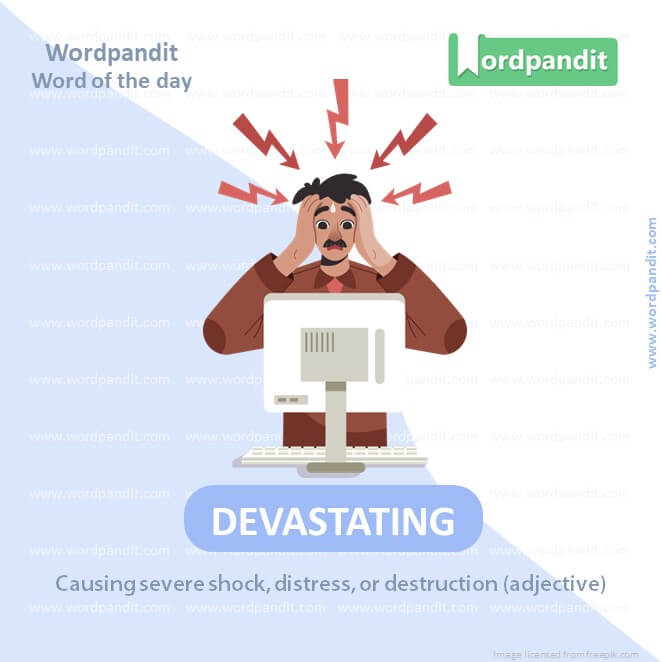
WORD-6: Devastating
CONTEXT: the Conservatives were locked into a cycle that pointed to a devastating defeat.
SOURCE: Guardian
EXPLANATORY PARAGRAPH: When something causes a lot of damage or destruction, it’s called devastating. It’s like when a storm destroys houses and trees.
MEANING: Causing severe shock, distress, or destruction (adjective).
PRONUNCIATION: DEH-vuh-stey-ting
SYNONYMS: destructive, ruinous, catastrophic, harmful, disastrous
USAGE EXAMPLE:
1. The hurricane had a devastating impact on the coastal towns.
2. The news of his death was devastating to his family.
3. The fire caused devastating damage to the forest.
4. The loss of her job was devastating for her.
WORD-7: Extricate
CONTEXT: The real question facing the Conservatives today is not whether they can extricate themselves from this predicament and win an election while still in government.
SOURCE: Guardian
EXPLANATORY PARAGRAPH: When you free someone or something from a difficult or tangled situation, it’s called extricate. It’s like untangling a knot to set something free.
MEANING: Freeing someone or something from a difficult or tangled situation (verb).
PRONUNCIATION: EK-struh-kayt
SYNONYMS: free, release, liberate, untangle, disentangle
USAGE EXAMPLE:
1. They managed to extricate themselves from the dangerous situation.
2. The rescue team worked to extricate the trapped hikers.
3. She needed help to extricate her car from the mud.
4. He tried to extricate his thoughts from the confusion.
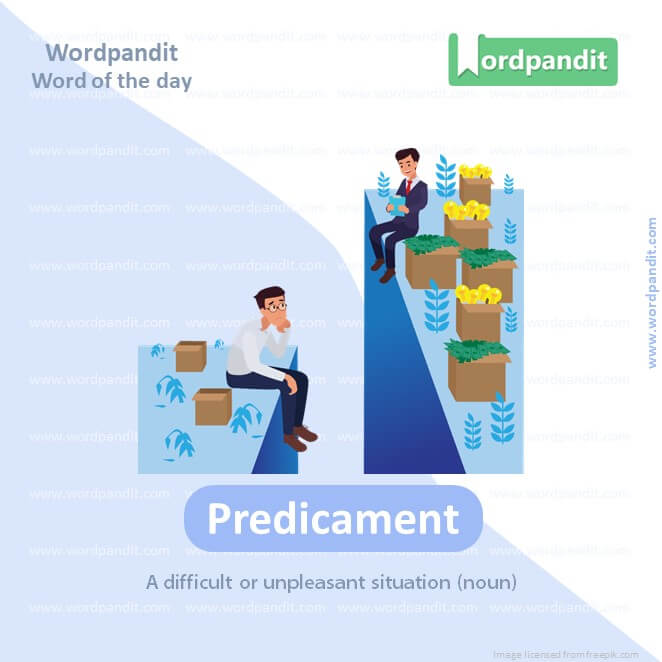
WORD-8: Predicament
CONTEXT: The real question facing the Conservatives today is not whether they can extricate themselves from this predicament and win an election while still in government.
SOURCE: Guardian
EXPLANATORY PARAGRAPH: When someone is in a difficult or tricky situation, it’s called a predicament. It’s like when you’re stuck between two choices and don’t know what to do.
MEANING: A difficult or unpleasant situation (noun).
PRONUNCIATION: pri-DIK-uh-ment
SYNONYMS: dilemma, quandary, problem, difficulty, crisis
USAGE EXAMPLE:
1. She found herself in a predicament when her car broke down.
2. The company faced a financial predicament.
3. He’s trying to find a way out of his predicament.
4. The predicament they were in required quick thinking.
WORD-9: Squabbling
CONTEXT: The truth is that the future of the Tory party does not rest in the personalities of those who are squabbling for Sunak’s job.
SOURCE: Guardian
EXPLANATORY PARAGRAPH: When people argue or fight over small or petty things, it’s called squabbling. It’s like when siblings argue about who gets the last cookie.
MEANING: Arguing or fighting over small or petty things (verb).
PRONUNCIATION: SKWOB-ling
SYNONYMS: quarreling, bickering, arguing, fighting, disputing
USAGE EXAMPLE:
1. The children were squabbling over the toys.
2. The neighbors were always squabbling about noise.
3. They spent the evening squabbling about trivial matters.
4. The team’s squabbling affected their performance.
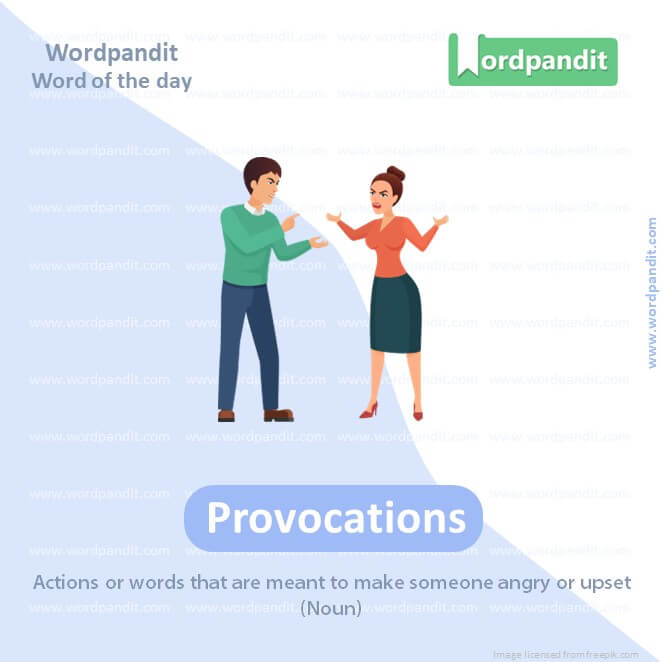
WORD-10: Provocation
CONTEXT: But his more recent descent into troubled waters did feel like a marked shift away from erratic provocation into fringe conspiracy.
SOURCE: Guardian
EXPLANATORY PARAGRAPH: When someone says or does something to make you angry or upset, that’s called provocation. It’s like when someone takes your toy and doesn’t give it back.
MEANING: Actions or words that are meant to make someone angry or upset (Noun).
PRONUNCIATION: proh-vuh-KEY-shuhn
SYNONYMS: incitement, instigation, annoyance, irritation, stimulus
USAGE EXAMPLE:
1. His teasing was seen as provocation by his classmates.
2. The article was written with the intent of provocation.
3. She ignored his provocation and remained calm.
4. The provocation led to a heated argument.
Vocabulary Daily Words
Among the myriad aspects of language learning, the role of ‘vocabulary daily words’ attests to their undeniable importance. These everyday words form the bedrock of communication. Whether used in casual chat or formal discussion, the fluency and understanding of ‘vocabulary daily words’ can significantly uplift the quality of interaction. However, the vital question is, how to effectively learn these ‘vocabulary daily words’?
The crux of learning ‘vocabulary daily words’ lies in a well-rounded approach that encompasses exposure, understanding, memorization, and practice. Rote memorization might seem like a quick solution, but it lacks context and, thereby, retention. Hence, opt for a diverse range of resources like books, newspapers, podcasts, and digital media. These will bring ‘vocabulary daily words’ to life, providing real-life usage examples and making the learning process inherently engaging.
Next, using memory-enhancing techniques can significantly improve retention of ‘vocabulary daily words’. Techniques such as flashcards or the Leitner System align with the principles of spaced repetition, allowing more effective and long-term learning. Incorporating mnemonic devices, associating new words with unique stories or images, can further facilitate this learning process.
The key to fully grasping ‘vocabulary daily words’ lies in practical usage. Make it a habit to use these words in your daily communications. Whether it’s a friendly conversation, a professional email, or a social media post, try integrating these new words. Doing so provides hands-on practice, strengthening your comprehension and application of these words.
In a nutshell, ‘vocabulary daily words’ are a treasure in the language learning landscape. By harnessing diversified resources, utilizing memory techniques, and actively using these words, your grip on the ‘vocabulary daily words’ will strengthen significantly. So, turn the pages, hit play, start a conversation, and let these ‘vocabulary daily words’ shape the story of your linguistic journey.











